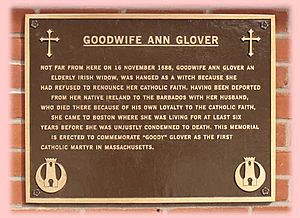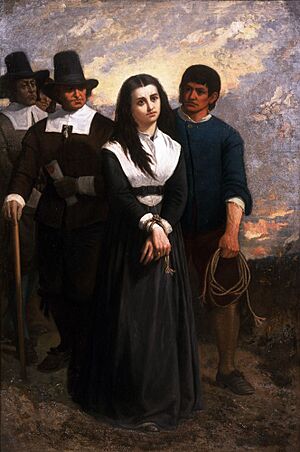Ann Glover facts for kids
Quick facts for kids
Ann Glover
|
|
|---|---|

|
|
| Died | November 16, 1688 |
| Known for | The last person to be hanged in Boston for witchcraft |
Ann Glover (died November 16, 1688) was the last person to be hanged in Boston for being accused of witchcraft. This happened a few years before the more famous Salem witch trials in nearby Salem, Massachusetts, which took place mainly in 1692. People sometimes called her "Goody" Ann Glover. "Goody" was a common way to address married women in those days.
Ann Glover's Story
It's hard to find official records of Ann Glover's trial. This might be because it happened during a short and difficult time called the Dominion of New England. This was when a governor chosen by the king, Edmund Andros, was in charge.
Historians learn about Ann Glover from a few main sources written around the time she lived:
- Cotton Mather wrote a book called Memorable Providences in 1689. He wrote a lot about the trial. Mather even said that the children Ann Glover supposedly bewitched kept suffering after she died.
- Judge Samuel Sewall kept a diary. This diary is important because it tells us the exact date Ann Glover was executed. It also names some of the people involved in her case.
- A Boston merchant named Robert Calef wrote More Wonders of the Invisible World in 1700. Calef believed that Cotton Mather played a big role in starting the witchcraft accusations.
Life in Boston
By 1680, Ann Glover and her daughter Mary lived in Boston. At that time, Boston was part of the Massachusetts Bay Colony. They worked as housekeepers for a man named John Goodwin.
In the summer of 1688, something happened that changed Ann's life. John Goodwin's 13-year-old daughter, Martha, accused Ann Glover's daughter of stealing laundry. This led to a big argument between Ann and Martha, along with the other Goodwin children. After this argument, the Goodwin children started acting strangely and became ill. The doctor who examined them couldn't figure out what was wrong. He suggested that their sickness was caused by witchcraft.
The Trial
Ann Glover was arrested and put on trial for witchcraft. When she was questioned, people couldn't understand her answers. At first, some thought she was speaking a language of the devil. But it soon became clear she was speaking Irish, her native language. She seemed to have forgotten how to speak English, even though she could still understand it. An interpreter was found, and the trial continued.
Cotton Mather, who was a minister and involved in the case, described Ann Glover as "a scandalous old Irishwoman, very poor, a Roman Catholic and obstinate in idolatry." During her trial, she was asked to say the Lord's Prayer. She could say it in Irish and some Latin, but not in English. People at the time believed that if someone couldn't say the Lord's Prayer, it was a sign they were a witch.
When her house was searched, "small images" or doll-like figures were found. These were thought to be used for witchcraft. Cotton Mather also said that Ann Glover claimed to pray to many spirits. Mather believed these spirits were demons.
Many of the accusations against Ann Glover used something called spectral evidence. This means that people claimed to see her spirit doing bad things, but there was no physical proof. Some people thought Ann might have been mentally ill. Five out of six doctors who examined her said she was mentally sound enough for trial. Because of this, she was found guilty.
Execution and Final Words
On November 16, 1688, Ann Glover was hanged in Boston. A crowd gathered, and some people mocked her. As she was being led to her execution, she said that her death would not make the children better. She believed the children would keep suffering because she wasn't the only witch involved. However, she refused to name anyone else.
A Boston merchant named Robert Calef, who knew Ann Glover, said that she was "a despised, crazy, poor old woman, an Irish Catholic." He also said that her behavior at the trial was like someone who was confused. Calef believed the proof against her was very weak. He noted that she died as a Catholic.
Many people now question the evidence used against her. When Ann Glover said she prayed to many spirits, she might have been talking about Catholic saints. The dolls found in her house, thought to be for witchcraft, could have been simple figures of Catholic saints. Most people in Boston at that time were Puritan, and they often had strong feelings against Catholics.
Ann's daughter, Mary, was deeply affected by her mother's trial. She suffered a mental breakdown because of the stress. Mary Glover was later imprisoned in Boston.
Legacy
Three hundred years later, in 1988, the Boston City Council declared November 16 as Goody Glover Day. She is the only person accused of witchcraft in the Massachusetts Bay Colony to receive such a tribute. Ann Glover's trial and death happened before the more widely known Salem Witch Trials. Her case helped set the stage for many of the accusations that would follow in 1692.
See also
- List of people executed for witchcraft
- Salem witch trials
 | Precious Adams |
 | Lauren Anderson |
 | Janet Collins |


